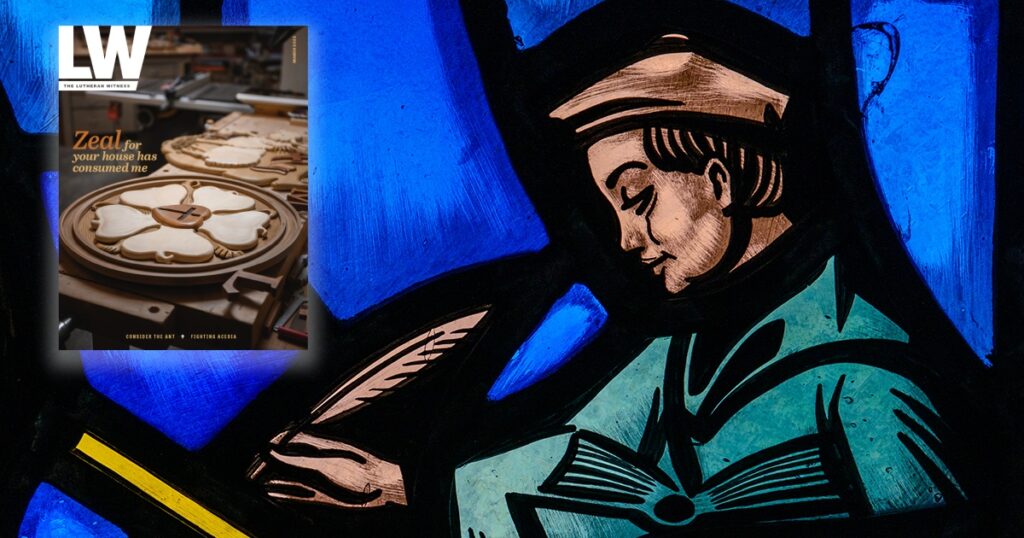Sloth, also known as acedia, is one of the “Seven Deadly Sins” of the Roman Catholic Church tradition. Lutherans confess and teach that all sins are equally deadly, yet we also recognize that some sins are especially damaging to faith and life in Christ. The Lutheran Confessions warn of mortal sins. Sins that cannot coexist with faith are labeled “mortal” since they evince a dying or dead faith (see, for example, Ap IV 48). Like the wheat planted among the thorns, these sins choke out faith and prevent it from growing (Matt. 13:22). Forgiveness for all sins is found only and fully in Christ Jesus.
At the same time, “vice” often means something along the lines of “bad behavior.” People might say, “He’s got some vices,” by which they mean he smokes or drinks too much. The vice of acedia is more than “bad behavior.” Acedia is sloth, but more than just typical laziness. The root of general indolence for the Christian often rests in a far more dangerous variety of acedia: spiritual sloth, a loss of zeal and desire for God’s Word and gifts. The Seventh Commandment, “You shall not steal,” condemns laziness. But spiritual sloth, acedia, laziness in the things of God, stands condemned beneath the Third Commandment: “Remember the Sabbath day by keeping it holy,” and therefore also the First: “You shall have no other gods.”
In this issue, we take a hard look at acedia and the way it affects our lives. The Rev. Jason Braaten explains the history of the word and the multitude of ways we struggle with sloth. Then the Rev. Dr. Stephen Pietsch offers some suggestions for fighting sloth in your daily life.
But the issue is not solely about pointing out the vice. Stacey Egger, staff writer at the LCMS, wrote a story on the Rev. Dr. William Matzat, a retired pastor who serves the church in his retirement. He warns against the lack of meaning and concomitant sloth that can accompany retirement, and points out — as does his pastor — the great opportunities retired people have to serve Christ’s church in many ways.
If the person struggling with acedia transgresses the Seventh Commandment by failing to work in a godly way, how then should we work? In “And Still Takes Care of Them,” I begin to struggle with this question. In many ways, the answer will depend on your own situation. But at the very least, asking the question and examining it in light of God’s promise to provide for all your needs of body and soul will get you thinking in the right direction.
In the end, the answer to sloth is zeal, a passion for God’s Word and His gifts. If you struggle with appreciating and receiving God’s gifts, this issue is for you. May you find in it the encouragement to return to God and His Word, and the life He gives therein.
Zealous in Christ,
Roy S. Askins
Managing Editor, The Lutheran Witness








RE: “In the end, the answer to sloth is zeal, a passion for God’s Word and His gifts.”
Jesus “gave himself for us to redeem us from all lawlessness and to purify for himself a people for his own possession who are zealous for good works.” (Titus 2:14 ESV, emphasis added)
Where Christian brothers and sisters discover joy in coming together to meet a genuine need in their community, zeal for further effort results.
“For we are his workmanship, created in Christ Jesus for good works, which God prepared beforehand, that we should walk in them.” (Eph. 2:10 ESV)
I think there is sometimes a seeming loss of zeal for the faith, even among ardent believers, not due so much to sloth, but because we are so easily distracted, beset by trials, and everyday occurrences, needs, and practical necessities. Plagued with one crisis after another, some people fall into depression, but I have to conclude that for this reason the Lord provides us with grace. He alone knows our true hearts, our emotional states, and our trials, and mercifully we are assured that we are forgiven of our failures. And I also believe that where zeal begins to weaken, the Holy Spirit, ever the divine helpmate and counselor, holds us firmly. This narrow earthly journey is a winding path, and we stumble along our way. Grace, Grace, Grace. Thank God for His grace, and if we lose our zeal for a time, it will return. God will not keep us from losing it. Soli Deo Gloria.
Last sentence was an error. I meant to say, “God will keep us from losing it.” (Zeal)